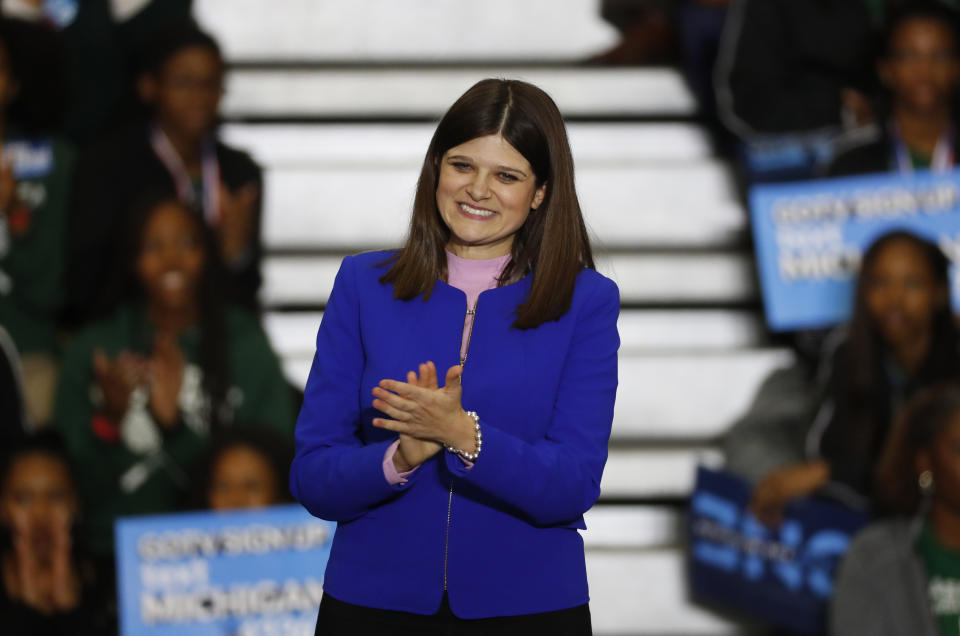Battle for the soccer-mom vote plays out in suburban Detroit

If there is one category of voter that both parties covet more than any other this year, it is white, suburban, college-educated, politically moderate women — the demographic that used to be called “soccer moms.”
That group, once reliably Republican, has been increasingly likely to vote Democrat in recent elections, and when they do, they tend to provide the margin of victory.
In the 11th Congressional District of Michigan, a full-on appeal for those votes is underway between Democrat Haley Stevens and Republican Lena Epstein, and it is a revealing window into how both parties value this particular demographic.
This is the Michigan district considered most likely to flip from Republican to Democrat this year, a match between two female first-time candidates who are exactly like the voters they are courting: white, female, suburban and college-educated. Both also take pains to describe themselves as moderate.
And both hope to convince voters that the other isn’t a moderate at all.
Stevens, who polls show leading slightly in the race for the seat being vacated by Republican incumbent Dave Trott in this Republican-leaning district, has ties to the Obama administration. In 2009, she coordinated its bailout of two Michigan-based automakers. Among her central issues are adding a public option to Obamacare and raising the federal minimum wage to $15.
Epstein, in turn, has ties to President Trump, as co-chair of his victorious Michigan campaign. She is co-owner of her family-run oil business, and her message is one of lower taxes and fewer regulations, particularly on the auto industry. The district is a close suburb of Detroit.

The changing allegiances of this coveted subset of female voters actually began in 2016. Trump got 52 percent of the votes of white women — not among women in general, as he has repeatedly claimed at rallies for the past two years, and possibly less than that, based on some studies that place it at 47 percent to Hillary Clinton’s 45. Even 52 percent was the lowest percentage of white women to vote for a Republican candidate since 2000.
Among white women who were also moderates, college-educated and suburban, there was a six-point gap in 2016, favoring Clinton. A recent Washington Post poll of 59 key House races found that the group now favors Democrats by 30 points. And the Los Angeles Times pollsters report that the divide increased steadily to this point: 17 points over the summer, it was 26 points in September.
Then came the Kavanaugh hearings, and a poll by Morning Consult and Politico found that Trump’s support among Republican women in general had dropped by 19 points. The Republican lead among married, white, college-educated women in that poll was even more eroded, with CNN and USC Dornsife/Los Angeles Times polls each showing Democrats capturing an unprecedented 67 percent of college-educated white women, while the Pew Research Center measured their support at 63 percent.
Which is why both candidates in Michigan’s 11th District are aiming messages directly at these voters, albeit in very different ways. “They are both aiming for practical, pragmatic, toward the center,” said John Truscott, founder of Truscott Rossman, a bipartisan political public relations firm in Michigan.
On a map, MI-11 is a twisty, turning place, created from parts of southeastern Oakland County and western Wayne County to capture red votes while leaving bluer areas to districts closer to Detroit proper. It last elected a Democrat to a full term in the 1960s. It is a prosperous district, particularly in comparison to the city of Detroit. Though it has voted Republican for years, “it has changed a lot, and fairly recently,” Truscott says. “The conservative base continues to move further away from the urban areas, even further out than these suburbs, so the 11th is a mix of traditionally conservative areas mixed with some very liberal, highly educated ones.”

Because times are relatively good here now, Stevens is focusing on how she says Obama brought about that economic turnaround, especially the auto rescue efforts that she — as chief of staff to Obama’s “car czar” Steve Rattner — helped to lead. Her campaign boasts she “saved over 200,000 jobs.” Epstein, in turn, is crediting Trump for the “historic economic growth” of the past two years, as well as the tax reform plan that she says will maintain that prosperity.
On social issues, both have been aiming to appear moderate. For Stevens, that means supporting buy-in to a Medicare-type of option rather than Medicare for All, talking a lot about infrastructure and reaching across the aisle. For Epstein, it includes stressing that parts of Obamacare should be saved, particularly coverage for preexisting conditions.
But with polls showing Epstein in danger of losing the key demographic of moderate, white, college-educated women, she is changing her message. Rather than working to prove she is a moderate, she has instead been stressing that her opponent is not.
A text message to voters from the Epstein campaign on Friday painted Stevens as a dangerous liberal. “Vote for Lena = JOBS,” it said. “Vote for Haley = more liberal MOBS. Lena and Trump need your vote NOW.”
_____
Read more Yahoo News midterms coverage:
In deep-red Missouri, McCaskill pursues voters far off the Democratic beaten path
With racial tension high in Florida race, Trump calls Gillum a ‘thief’
Menendez race pits ethical concerns against party loyalty, and loyalty is winning
Portrait of a moderate district: NJ-11 leans R, but the race leans D
Virginia Republican congressman tries to weather scandal and wave of spending



